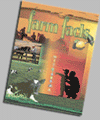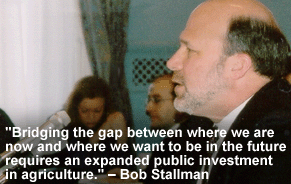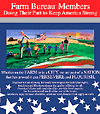| ||
|
|

Farm Bureau: New Farm Bill Must Balance All Interests
 |
Testifying at a hearing on federal farm policy, AFBF President Bob Stallman said, "We have a vision of a profitable agriculture from growing markets, increasing value-added efforts and providing voluntary, incentive-based conservation programs.
"Our vision is to capture the 'farm opportunity,' and, on a long-term basis, capture more of our income from the marketplace and less from government payments."
He said Farm Bureau is the only group to testify representing members who produce all agricultural commodities in all 50 states. "We, like this committee, must ensure balance between all those interests. We believe our recommendations achieve that balance, as well as stay within a reasonable budget request and our WTO (World Trade Organization) commitments."
Stallman said planting flexibility offered by the current farm bill has been one of its most important features and must be maintained in the upcoming legislation. That flexibility has allowed producers to plant for the market rather than for the government.
Before itemizing Farm Bureau's numerous recommendations for the new farm bill, Stallman said farmers will need another short-term relief package. "We believe Congress should approve $9 billion in emergency assistance for fiscal 2001 as soon as possible," the farm leader explained.
Government payments have provided a substantial portion of farm income over the past three years. Stallman said cutting those payments would hurt farm income and would begin to undermine the financial balance sheet of the farm sector.
While supporting continued direct payments, Stallman said new income support payments should be "counter-cyclical" with those support levels declining when farm income improves. He also called for rebalancing loan rates between commodities.
The AFBF president said the organization's board believes that after three years of low income in the agricultural sector, an additional $12 billion per year will be needed for Farm Bureau's overall proposal, starting in fiscal 2003 (or in fiscal 2002 if the new farm bill is completed earlier).
Farm Bureau also recommended that up to $1.5 billion a year be authorized on an as-needed basis for counter-cyclical payments to producers of fruits and vegetables.
"Bridging the gap between where we are now and where we want to be in the future requires an expanded public investment in agriculture," Stallman said. He said that must include funding increases for conservation, research and export promotion activities.
Stallman's testimony included a list of nearly two dozen programs,
regulations and tax code reforms outside the purview of the Agriculture
Committee but directly affecting the economic well-being of the industry.
These included such items as biotechnology, ethanol, the Food
Quality
Protection Act, capital gains taxes, trade sanctions and WTO
negotiations.
"It is important to note that not all farm policy issues are farm bill issues," Stallman said. "We are here to discuss the next farm bill but there are many outside factors that will have an effect on the success of this policy. The current U.S. farm program attempted to move agriculture toward greater reliance on markets and put producers back in the driver's seat regarding farm production decisions.
"But," Stallman added, "until the federal government seriously undertakes reforms in other areas crucial to agriculture – trade, regulatory costs, taxes – American farmers will continue to be hamstrung."
| Contacts: | Don Lipton (202) 484-3624 donl@fb.org |
Dave Lane 202/484-3610 davel@fb.org |
This page was last modified Fri Mar 02, 2001 at 10:19 am
American Farm Bureau Federation, Farm Bureau and the FB Logo are registered service marks of the American Farm Bureau Federation. Voice of Agriculture is a registered service mark of the American Farm Bureau Federation.
